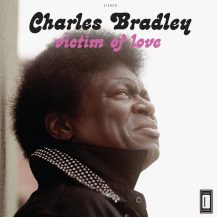Charles Bradley – ‘Victim of Love’
“Bradley has managed to make two records that have securely tied the knot between generations seemingly too far apart, too different. Young people of the 2000s have fallen in love with music inspired by African American traditions from four or five decades ago.”
Hannah Cook
7
out of 10
Charles Bradley
Victim of Love
April 2nd, 2013
Daptone Records
Often times, fame can ruin a persons life, if not end it. Look at the rock heroes of yesteryear (on the grand scheme of things): Jim Morrison, Jimi Hendrix, Janice Joplin. With fame came money, and with money, drugs… you know the rest: trading one thing for another in greatness’s name.
And while that observation may be a cliché, it’s important to note that the same cannot be said of Charles Bradley. The 64(??)-year-old’s well-deserved spotlight could very well have saved his life. With a heartbreaking story of death, homelessness and illness behind him–supporting him even–Bradley faced fame the right way: with earnest appreciation, not arrogance. He knew he was one of the lucky ones and that idea is the essence of his fans’ admiration for him, and why it continues to grow.
His live performances say it all. For one night we become Bradley’s brothers and sisters. He preaches, but not from a pedestal. At times, he’s downtrodden, bellowing with utter grief about life’s difficulties. At other times, he’s straight boogying, his white teeth gleaming. His passion is staggering and his voice even more so. There is a reason he’s been compared to the greats like James Brown and Otis Redding.
No Time For Dreaming, Bradley’s debut effort released in 2011 on Dualtone Records, was his coming of age in the music world. The album was his call for change after having witnessed such coldness in the world. Honestly troubled but still glittering with hope, Bradley in No Time For Dreaming let us know who he is from the start.
Two years later and Bradley remains as truthful as ever in Victim of Love. This is a man who loves love, who depends on love for the goodness of the world, and who is in love with just about everyone. The album is simple, reflective of Motown’s finest moves with a few modern twists thanks to the youngins of the Menahan Street Band backing Bradley up.
While there is little left up to the imagination as far as lyrical interpretations go, there is a whole lot to feel. Bradley’s screams and Menahan’s Street Band’s grooving vibes are enough to drop panties, but that’s not the point. The point is to feel connected to something and Victim of Love does just that, from the harmony-drive ballad “Victim of Love” to the whacky instrumentals of “Confusion.”
Bradley has managed to make two records that have securely tied the knot between generations seemingly too far apart, too different. Young people of the 2000s have fallen in love with music inspired by African American traditions from four or five decades ago. Of course there lately has been that trend of listening to music history’s best (it came with the vinyl revitalization), but that’s just it. They’ll all from our history. Are there any musicians of our day who will have that lasting impact on music years from now? That thought worried me until Charles Bradley came along. He is one of our greats, so closely connected to our past as he may be.
[youtube id=rgnQYvzRDiQ]
